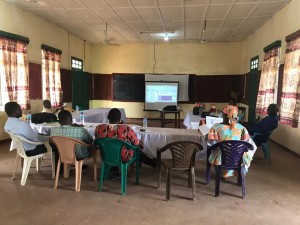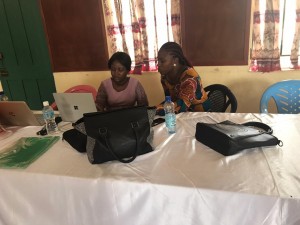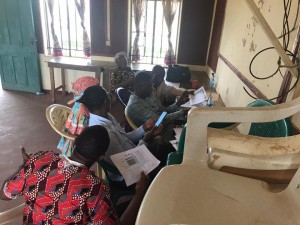PBF PROJECT PROMOTING THE SAFETY AND SECURITY OF WOMEN IN THE SOUTHERN PROVINCE
A startup workshop held on the 31st January, 2020 with implementing partners from WICM , CWS and WAVES in line with the PBF Project; ‘Promoting the safety and security of women in the southern Province’.



participants in the training workshop
Food insecurity is a major challenge in rural Sierra Leone. Although women, youth and men continue to make efforts towards food safety and security, unavailability of modern technology and resources to increase productivity, marketing as well as knowledge of post-harvest management are bottlenecks to these processes.
This project which was supported by Catholic Relief services, attempted to contribute to sustainable food security through honey production and growing of vegetables.
The sale of surpluses of these vegetable products in the local market was aimed at increasing household economy. As direct beneficiaries, 80 women and 40 youths were stimulated to actively engage in this “change initiative” through an organized social group known as “Serabu Self-Help Development Association” The project was funded for seven months which started in February 2014. It is responding to CAFOD’s priority on Livelihoods (Food security and value chain support) through Beekeeping and Vegetable production. The total approved project cost is $ 50,000 with an equivalent value of SLL 215,000,000 in local currency.
In Bumpeh Ngawo Chiefdom in Bo District, the household population of approximately 35,642 ( 17, 129 males and 18,513 -Statistics Sierra Leone Housing population 2004) are no exceptions to the rural poor communities where the need for increased agricultural productivity and household economy are dire. The mis-match between demand and supply of food largely as a result of the use of production methods of subsistence farming and use of crude tools such as cutlasses, hoes and the use of manual labour are key determinants of food security. Annual yields were enough to feed farming families only for a few months. The absence of surpluses for possible marketing as household incomes kept the population within the poverty trap. The “No Money, No Voice” syndrome affected women and the unemployed youth who form 38% of the national population (Youth Commission Report 2014).
Overall Objective:
The overall goal of the project was to empower 80 women and 40 youths in the area of food security and income generation through Bee keeping and Vegetable production in the Serabu community.
Specific Objectives were:
- To enable 120 members of the Serabu community (80 women and 40 youths) to increase their productivity and income by July 2014, thereby enhancing their living conditions.
- To economically empower and thus be in a position to have a say in their community.
The out Outcomes/outputs were:
- 120 beneficiaries (80 women and 40 youth) brought under one group to pool their energies together to work toward partially addressing their food security
- Beneficiaries contribute to their own food and income security by organized honey production and vegetable cultivation with yields of both commodities maximized
- Project participants demonstrating Improved skills in modern bee keeping and vegetable cultivation, skills that will maximize their productivity/yield that will optimize their income.